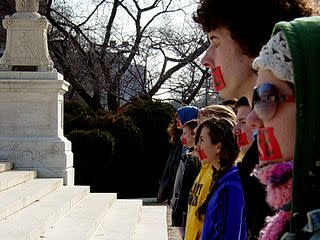Supreme Court rules against abortion clinic buffer zones

Pro-life demonstrators at the Supreme Court
In yet another unanimous decision in a controversial case, the Supreme Court struck down a Massachusetts law requiring 35-foot buffer zones around the entrances to abortion clinics, saying that the law goes too far in restricting the free-speech rights of anti-abortion activists.
Chief Justice John Roberts, writing for the Court in McCullen v. Coakley, recognized the state’s interest in promoting safety near and access to reproductive health care facilities. But he—joined by Justices Ginsburg, Breyer, Sotomayor and Kagan—said the law was not drawn narrowly enough.
“Petitioners wish to converse with their fellow citizens about an important subject on the public streets and sidewalks—sites that have hosted discussions about the issues of the day throughout history,” Roberts wrote. “Respondents assert undeniably significant interests in maintaining public safety on those same streets and sidewalks, as well as in preserving access to adjacent healthcare facilities.”
“But here the Commonwealth has pursued those interests by the extreme step of closing a substantial portion of a traditional public forum to all speakers,” he explained. “It has done so without seriously addressing the problem through alternatives that leave the forum open for its time-honored purposes. The Commonwealth may not do that consistent with the First Amendment.”
In a separate concurrence, Justice Antonin Scalia—joined by Justices Kennedy and Thomas—said the majority didn’t go far enough.
“The Court’s analysis today, invalidating the law at issue because of inadequate ‘tailoring,’ is certainly attractive to those of us who oppose an abortion speech edition of the First Amendment,” wrote Scalia. “But think again. This is an opinion that continues the onward march of abortion-speech-only jurisprudence.”
Justice Samuel Alito wrote yet another opinion, concurring only in the judgment.
The high-profile case featured the 77-year-old Eleanor McCullen, a member of the anti-abortion group Operation Rescue. She challenged a 2007 Massachusetts law that makes it a crime for public speakers other than clinic employees to be within 35 feet of entrances to facilities such as the one she frequents.
By making an exception for clinic employees, McCullen argued, the law’s “buffer zones” discriminated on the basis of the views of the speaker—even if the speaker is behaving in an orderly manner—thus violating her First Amendment right to free speech.
In contrast, Massachusetts state officials pointed to a harrowing history of violence and disorderly conduct outside of reproductive health care facilities in the United States. Moreover, the buffer zones applied to the conduct of all—regardless of a speaker’s point of view.
The state also relied on precedent. In Hill v. Colorado (2000), the Supreme Court upheld a similar law in Colorado that made it illegal for protesters to be within eight feet of anyone within a 100-foot buffer zone around such facilities. Yesterday’s decision appears to leave Hill intact.
Mark Rienzi, a lawyer for McCullen, told the Wall Street Journal that the ruling “confirms that the First Amendment is for everyone.” The government, he said, “cannot reserve its public sidewalks for Planned Parenthood, as if their message is the only one women should be allowed to hear.”
Abortion-rights advocates, on the other hand, were critical of the ruling.
“This decision shows a troubling level of disregard for American women, who should be able to make carefully considered, private medical decisions without running a gauntlet of harassing and threatening protesters,” Cecile Richards, president of Planned Parenthood Federation of America, told the WSJ.
Nicandro Iannacci is a web strategist at the National Constitution Center.
Recent Stories on Constitution Daily
Supreme Court limits, but also preserves, recess appointment powers
Event preview: Scholar traces equality in the Declaration of Independence

